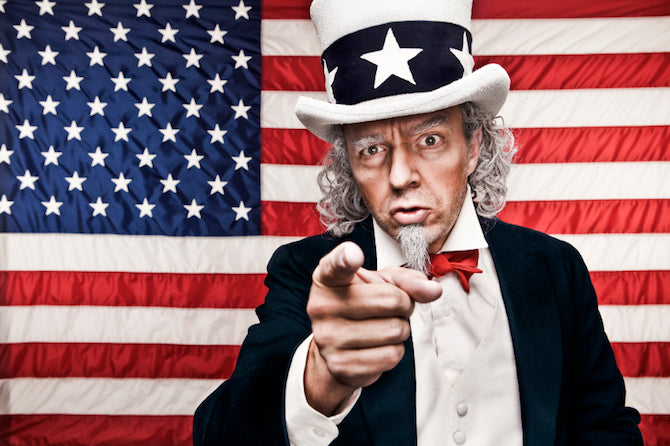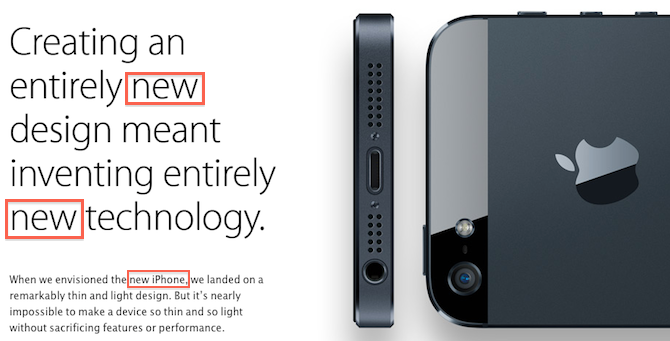4 Magic Words That Increase Sales

There are four secret weapons in the marketing copywriter's arsenal that can have immense power.
Four words have been defined by recent studies in behavioral economics, psychology and neuroeconomics to appeal to consumers primal instinct. These words powerfully engage consumers at a subconscious level and increase retailers chances of making a sale.
Inject these 4 words into your marketing copy and ecommerce product descriptions to increase conversions:
1. You

It's the most powerful word in the English language. For most marketers, It's more influential than words like 'money' and 'sex.' Your customers want to feel like you're talking to them directly and the word 'you' does that better than any other word.
Whether we like to admit it or not, we're all a bit egocentric. When promotional copy (or product descriptions / ads) focus directly on us, a powerful subconscious connection is created.
Here's an example of an online retailer who uses the word 'you' in their product descriptions to increase their conversion rate:
“The Epson ES1000 Ultra Portable Tabletop Projection Screen is the ultimate screen for mobile professionals. Whether you're walking across town, commuting by car or flying to your next destination, this lightweight, compact screen is the perfect traveling partner for on-the-go presentations. When you're ready to present, the Epson ES1000 Ultra Portable Tabletop Projection Screen's unique one-piece design allows you to set up quickly and easily on any tabletop in less than 30 seconds. It conveniently accommodates up to a 50" (diagonal) image. When it's time to shut down, the Epson ES1000 Ultra Portable Tabletop Projection Screen stores quickly and easily in just seconds.” (Source, TigerDirect)
A form of the word 'you' appears 4 times in this clever marketing copy. Notice that the narrative is focused on how this portable projector makes the shopper's life easier. It's solving a problem that most prospects have.
Take a look at all of your ecommerce product descriptions and make sure you're addressing your prospects directly. Use words like "you," "your," and all similar forms to make a connection with your customers and potentially increase sales.
2. New

When you see the word 'new' you subconsciously think improved, exciting, and I want. According to several behavioral psychology studies, new products, novel solutions, and a sense of adventure draw shoppers to products with the 'new' label.
Take a look at how Apple describes the iPhone 5's design. It's a new design, with new technology, for their new iPhone. Seems excessive when pointed out but it works.
Dr. Bianca Wittmann is a cognitive neuroscientist who studies how copywriters use language to influence shoppers. She uses the candy industry's obsession with creating 'new' products as an example:
"I might have my own favorite choice of chocolate bar, but if I see a different bar repackaged, advertising its ‘new, improved flavor,’ my search for novel experiences may encourage me to move away from my usual choice."
Consumers have a positive association with everything new - we're constantly wanting a newer car, new clothes, and the newest technology. As an online merchant you should play to this as much as possible.
If you sell clothes online, for example, create a section to showcase all your latest products. Make sure your product descriptions, press releases, and blog posts use the word 'new' and focus on new products as well.
3. Free

The word 'free' isn't just a price - it's a powerful emotional trigger and a source of irrational excitement. You know that feeling you get at a buffet, where you're full but you keep eating because it's free? Or perhaps all those free pens you took at the trade show that you won't use but you took them anyways? Powerful stuff that word 'free' is.
Nobody knows the power of using the word 'free' like Amazon.In 1999, Amazon began offering free shipping on orders of $99 or more. Since then they have been experimenting with and perfecting their marketing strategy (and copywriting) to best take advantage of our desire for 'free.' I know I'm guilty of buying another book (cost $10+) just to save $3.95 on shipping.
Gregory Ciotti, founder of Sparring Mind, argues that the word 'free' exposes humanity's general aversion to loss. In economics, loss aversion describes the idea that people will frequently choose not to lose something (money) rather than to gain something, even something of relatively greater value.
To make this point, Ciotti refers to research from famous behavioral economics professor, Dan Ariely. In a series of experiments, Ariely found that consumers would pick a free item over a very low-cost item, even when that low-cost item represented a greater overall value.
When Ariely offered buyers a choice between a Lindt 'Lindor Truffle' for 15 cents — about half of its usual cost — and a Hershey Kiss for 1 penny, 73% chose the Lindt because of its apparent value. But when the price of both items was lowered by just one cent to 14 cents and free respectively, 69% of shoppers took the free Hershey Kiss.
So how do ecommerce merchants use this research, along with Amazon's "free shipping" strategy to increase sales? As an example, a retailer in the Northwestern US offers free shipping on some orders. The retailer first offered free shipping for orders of $50 or more. On average shoppers spent a little more than $50 on the site.
In November 2012, the policy changed, so that free shipping required a minimum $75 purchase. The retailer's average order rose to nearly $80. People spent more just to get something 'free' - so consider offering free shipping after a certain purchase threshold on your ecommerce store.
Furthermore, using the word free in your email campaigns can significantly increase open rate. Christopher Penn, the co-host of the “Marketing Over Coffee” podcast has pointed out that in-spite that the word 'free' can set off some spam filters, it's often worth using in email subject lines because of how dramatically it boosts open rates. Shoppers simply like the idea of getting something for nothing - and can you blame them?
4. Guaranteed

The sleazy used car salesman stereotype is often associated with a 'guarantee' - but the word 'guarantee' is a key component of most good ecommerce marketing copy.
'Guaranteed' appeals to consumers emotional triggers like security and trust. It's a safety net - a promise made by a retailer to a consumer that they will be satisfied with their purchase.
Studies in behavioural economics show that humans are intrinsically afraid of loss. When you purchase something there is the chance of disliking the item for one reason or another. Guaranteeing their purchase diminishes the possibility of loss. If they don't like the item, they can return it.
Ecommerce merchants should inject their copy with 'guarantee,' 'money-back guarantee,' and variations like 'or your money back' on their product page. You should also develop a return policy and it goes without saying that you must hold up your end of the guarantee.